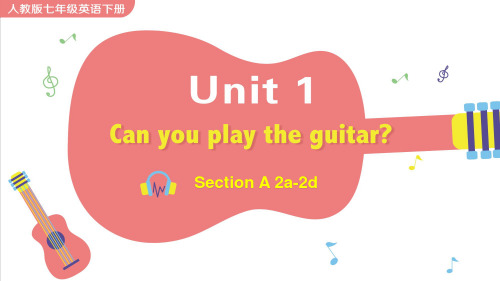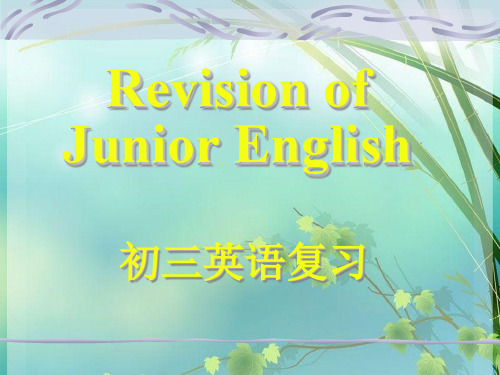初中英语课件
- 格式:doc
- 大小:45.50 KB
- 文档页数:6













![初中英语说课课件(全英文)[优质PPT]](https://img.taocdn.com/s1/m/b55ddc33f12d2af90242e6e4.png)




四五单元单选1. What _________exciting news! We are all very excited about it. A. a B. anC. theD. /2. If you plan ________a movie, choose Mulan.A. watchB. to watchC. watchingD. watched 3. We hope ________goodgrades.A. getB. to getC. gettingD. got 4. I hope you ________a nice weekend.A. haveB. to haveC. havingD. had 5. Can you ________when the train will arrive? A. look B. look at C. find D. find out 6. Hi, Jean! Y ou lookunhappy. ____________?A. What did you happenB. What you happenedC. What happened to youD. Did you happen what 7. I didn’t expect ________anything enjoyable at all. A. saw B. seeC. seeingD. to see 8. Walt Disney was famous _______his cartoons. A. likeB. asC. atD. for 9. I don’t mind _________soap operas.A. watchB. to watchC. watchingD. watched 10. We waited an hour for Jack, but he didn’t ________. A. appear B. get C. arrived D. come out 11.His new book ________last weekend.A. came outB. came upC. came inD. came to 12. It’s cold outside. Y ou’d better _________more clothes. A. put on B. wear C. dress D. dress up 13. In summer, we should ________cool clothes. A. put on B. wear C. dress D.dress up 14. She ________and went to the party.A. woreB. put onC. dressedD. dressed up 15. She learns a lot_________the educational movie. A. in B. at C. to D. from16. Y ou can ask me ________question at ________time.A. some, someB. some, anyC. any, someD. any, any 17. Great changeshappened in China _________.A. in the 1980sB. in the 1980C. in 1980sD. on the 1980 18. They arrived________Beijing _________the morning of May 10. A. at, in B. at, on C. in, inD. in, on19. _________July 12,2009, he went to Shanghai for the first time _________a plane.A. On, onB. On, byC. In, onD. In, by 20. Don’t worry. I’ll try my best________you.A. helpB. helpingC. helpsD. to help初中各年级课件教案习题汇总语文数学英语物理化学2 基本结构:①be动词;②行为动词否定形式:①was/were+not;②在行为动词前加didn't,同时还原行为动词。
一般疑问句:①was或were放于句首;②用助动词do的过去式did 提问,同时还原行为动词。
三、现在进行时:概念:表示现阶段或说话时正在进行的动作及行为。
时间状语:now, at this time, these days, etc. 基本结构:am/is/are+doing 否定形式:am/is/are+not+doing. 一般疑问句:把be动词放于句首。
四、过去进行时:概念:表示过去某段时间或某一时刻正在发生或进行的行为或动作。
时间状语:at this time yesterday, at that time或以when引导的谓语动词是一般过去时的时间状语等。
基本结构:was/were+doing 否定形式:was/were + not + doing. 一般疑问句:把was或were放于句首。
五、现在完成时:3 概念:过去发生或已经完成的动作对现在造成的影响或结果,或从过去已经开始,持续到现在的动作或状态。
时间状语:recently, lately, since…for…,in the past few years, etc. 基本结构:have/has + done 否定形式:have/has + not +d one. 一般疑问句:have或has。
六、过去完成时:概念:以过去某个时间为标准,在此以前发生的动作或行为,或在过去某动作之前完成的行为,即―过去的过去‖。
时间状语:before, by the end of last year(term, month…),etc. 基本结构:had + done. 否定形式:had + not + done. 一般疑问句:had放于句首。
七、一般将来时:概念:表示将要发生的动作或存在的状态及打算、计划或准备做某事。
时间状语:tomorrow, next day(week, month, year…),soon, in a few minutes, by…,the day after tomorrow, etc. 基本结构:①am/is/are/going to + do;②will/shall + do. 否定形式:①was/were + not; ②在行为动词前加didn't,同时还4 原行为动词。
一般疑问句:①be放于句首;②will/shall提到句首。
八、过去将来时:概念:立足于过去某一时刻,从过去看将来,常用于宾语从句中。
时间状语:the next day(morning, year…),the following month(week…),etc. 基本结构:①was/were/going to + do;②would/should + do. 否定形式:①was/were/not + going to + do;②would/should + not + do. 一般疑问句:①was或were放于句首;②would/should 提到句首。
一般过去时主要表示过去做过某事,对现在没有影响;而现在完成时则主要强调该动作对现在的影响。
例如:I bought an English-English dictionary. 我买过一本盈盈字典。
(意思是:我现在也许还拥有这本字典,也许给人了,也许丢了。
)I have bought an English-English dictionary.我已经买了一本英英字典。
(意思是:我现在拥有这本字典,不需要再买了。
)1 Here _____the bus!A is comingB comesC has comeD has beencoming2 It's the third time I ______him this month.A had seenB seeC sawD have seen3 If you go to the western suburbs of the city , you ___a lot of newbuildings .A will seeB have seenC seeD are goingto see4 ---- I have bought an English -Chinese dictionary. ----When and where ___you__ _it?A do buyB did buyC have boughtD had bought5 She showed him the photo she __the day before.A has takenB tookC was takingD had taken6 While Tom ___, his sister is writing.A readsB has readC has been readingD is reading7 By the time he was ten, Edison _____experiments in chemistry.A had already doneB already had doneC was already doing D already did8 I don’t know if it _____or not tomorrow.A will snowB snowsC has snowedD is snowing9 He was sixty-eight. In two years he _____seventy.A was going to beB would beC had beenD will be10 Tom ___for more than a week.A has leftB has gone awayC went awayD has beenaway现在完成时(1)现在完成时表示过去发生或已经完成的某一动作对现在造成的影响或结果。
通常与表示包括现在在内的时间副词just,already, before, yet, never, ever等状语连用。
例如:①I have never heard of that before. ②Have you ever ridden a horse? ③She has already finished the work. ④Have you milked the cow yet? Y es, I have done that already. ⑤I’vejust lost my science book. 有时没有时间状语;多是一般疑问句。